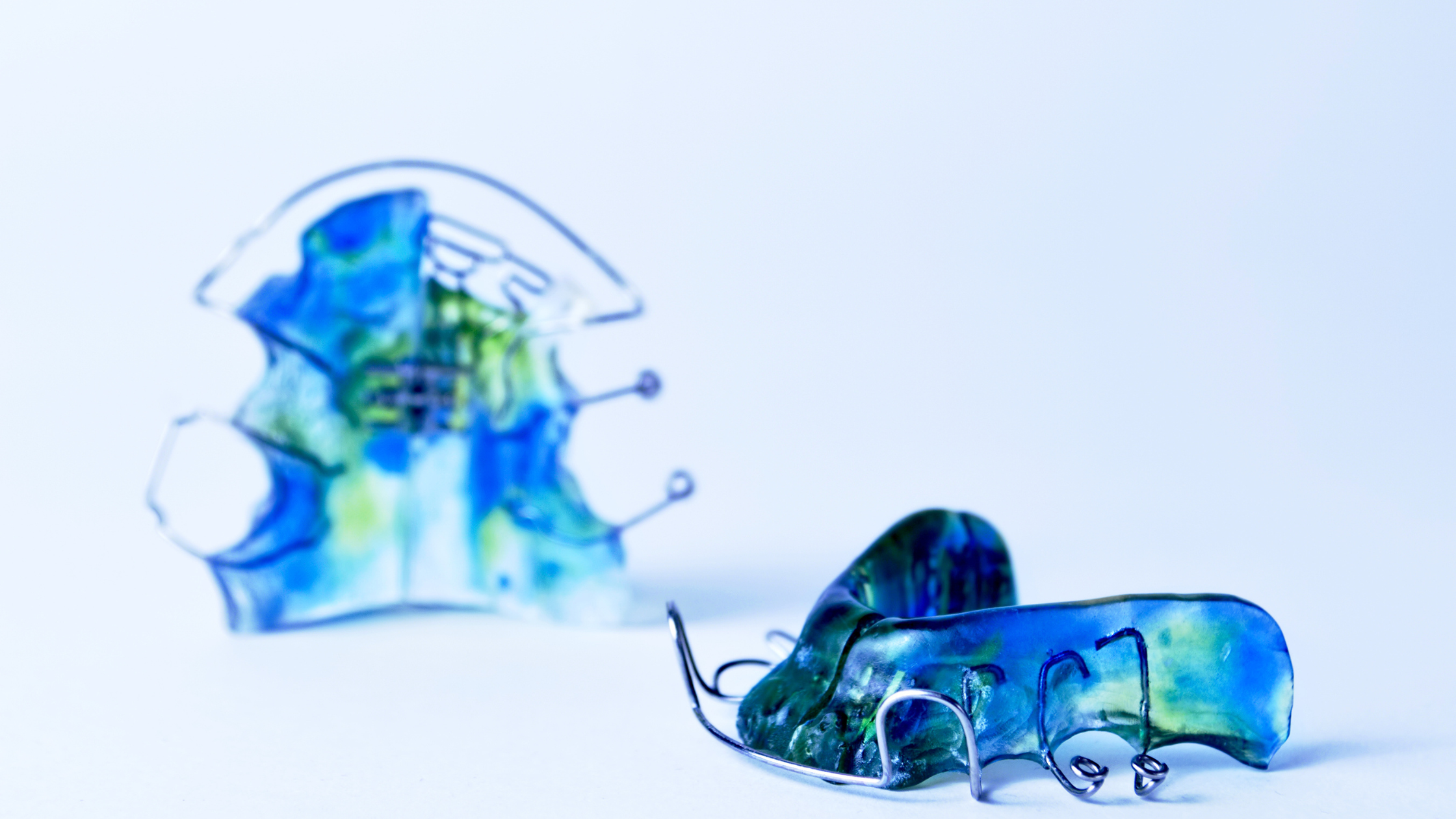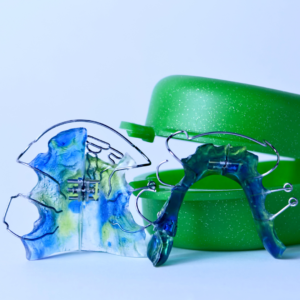After completing orthodontic treatment with braces, wearing retainers after braces is crucial to maintain the results achieved and ensure long-term stability. They play a vital role in keeping your teeth in their corrected positions and preventing them from shifting back to their original alignment.
Types of retainers after braces
The type of retainers you can get will depend on various factors, including your orthodontic needs and the recommendations of your orthodontist in Bergen County. They will assess your individual case and determine the most suitable type of retainer for you. The various types of retainers mentioned earlier, Hawley retainers, Essix retainers, and fixed retainers, are widely used options.
Oral Health Care while using Retainers
Wearing schedule: Your orthodontist will provide specific instructions on how often and for how long you should wear your retainers. Initially, you may need to wear them full-time, including during sleep, for a few months. Eventually, the wearing schedule may be reduced to wearing them only at night. Adjusting it may take some time to adjust to wearing retainers, especially if they are removable. Initially, you may experience some discomfort or speech changes, but these should improve with time as your mouth adapts to the retainers.
Proper care and maintenance: To keep your retainers clean and in good condition, following proper instructions is important. Remove them before eating, and brush them gently with a soft toothbrush and mild soap or non-alcoholic cleaner. Avoid exposing them to heat or hot water, as it can distort the retainers.
Long-term commitment: Wearing retainers is a long-term commitment to maintaining your orthodontic results. Gradually, your orthodontist may recommend reducing the frequency of wearing retainers, but it’s still important to continue using them as instructed to prevent any relapse in tooth movement.
What Kind of Retainers After Braces I Can get?
Retainers come in two varieties – Fixed and Removable. They both work similarly, but it will depend on your previous treatment and which one is best for you based on the orthodontist’s opinion.
Permanent Retainers After Braces
Permanent retainers, also known as bonded retainers or fixed retainers, are a type of retainer that is affixed to the back of the teeth using dental cement or adhesive. Unlike removable retainers, which can be taken out, they are designed to stay in place for an extended period or even indefinitely. Permanent retainers after braces are devices that clamp teeth in place and can be made of either a metal wire or elastic. They usually last until adulthood but often lose their ability to hold the tooth after about 10 years, requiring them to be replaced periodically if worn during sleep.
Removable Retainers After Braces
Removable retainers are a type of retainer commonly used after completing orthodontic treatment with braces. Unlike permanent retainers, which are bonded to the teeth, they can be taken out and reinserted as needed. Here are some important points to know about removable retainers after braces in Bergen County. They are designed to maintain the alignment and position of the teeth after orthodontic treatment, such as braces or clear aligners. These retainers are typically made of plastic or acrylic material and are custom-fitted to the individual’s teeth.
Can I Make it Fit Again?
If you can’t comfortably put your device back in your mouth, contact your orthodontist and schedule an appointment. During the visit, they will examine the teeth and retainers to identify what needs adjusting. They may be able to adjust a Hawley-type appliance or replace it with clear plastic so that it fits perfectly into place again.
Adjustments by a professional: If your retainers no longer fit properly, you should consult with your orthodontist or dentist. They can evaluate the fit and make any necessary adjustments to the retainers to improve their fitness. This could involve trimming or reshaping the retainers to match the current alignment of your teeth.
It’s important to consult with your orthodontist or dentist rather than attempting to modify or adjust the retainers yourself. They have the expertise and knowledge to properly assess your situation and provide appropriate solutions to ensure the retainers fit correctly and effectively maintain the alignment of your teeth.
How Will I Know My Retainer No Longer Fits?
If your retainer feels loose when seated properly, which may be caused by pressure on either side from improper alignment with adjacent teeth, then contact us for assistance right away.
Clear plastic retainers are easily affected by heat, so if you leave the retainer in a hot place for too long, it’s likely to lose its proper shape. If this happens, you can switch to your backup retainer or schedule a visit with an orthodontist who will examine and replace the damaged one.
- Tight-fitting
- Loose-fitting
- Swollen or irritated gums
- Visible changes in tooth alignment
- An increased sensitivity or bite changes
What Happens if I Fail To Wear My Retainers After Braces?
You should always wear your device so that you don’t have to go back through the expensive and time-consuming orthodontic process again. Otherwise, if you are not wearing them, teeth can drift out of alignment over time, eventually making it pointless for the treatment in the first place.
- Teeth shifting: The primary purpose of retainers is to maintain the alignment and position of your teeth after orthodontic treatment. If you neglect to wear your retainers, your teeth are more likely to shift and move over time. This can result in a relapse of your original orthodontic condition, and you may require further treatment to realign your teeth.
- Bite changes: Failure to wear retainers can also impact your bite. Your teeth and jaws are interconnected, and any changes in tooth position can affect how your upper and lower teeth fit together when you bite. This can lead to discomfort, difficulty chewing, and even TMJ (temporomandibular joint) issues.
- Discomfort and pain: If your teeth start shifting due to not wearing retainers, you may experience discomfort and pain as they move into new positions. This can include soreness, sensitivity, and difficulty with everyday activities such as eating and speaking.
It’s important to understand that retainers are a crucial part of the orthodontic treatment process. They help stabilize and maintain the results achieved through braces or aligners. To ensure the long-term success of your orthodontic treatment, it’s essential to follow your orthodontist’s instructions and wear your retainers as recommended. If you have concerns or difficulties with wearing your retainers, it’s best to communicate with your orthodontist to find a solution that works for you.
Should I Wear an Ill-Fitting Retainer after Braces?
It is recommended to wear a properly fitting retainer after braces as prescribed by your orthodontist. If you have been provided with a 3-fitting retainer, it is designed to accommodate the alignment of your teeth and provide the necessary support to maintain their position. If you feel your teeth shifting but still have a device that fits without too much pressure, go back to wearing it all day. It may be sensitive for a few days, but the sensitivity will eventually fade and make it more comfortable. Once this happens, then reduce wear time to just at night-time.
If your retainer is damaged or too loose, you may find that the retention force of your teeth will be diminished. Your orthodontist should know what to do if this happens, so contact an orthodontist as soon as possible.
Should I Repair it Myself?
Orthodontic appliances are quite complicated these days. Not only do they need to fit well, but adjustments require specialized instruments that you probably don’t have at home. If your device is too loose or tight in the mouth and it’s no longer fitting, then take a trip to see an orthodontist. They can ensure that your retainers are functioning correctly and provide the necessary support to maintain the alignment of your teeth.
Oral Health While Using Retainers After Braces
Maintaining good oral health is crucial for overall well-being and quality of life. A healthy mouth not only allows you to eat, speak, and smile confidently, but it also plays a significant role in your overall health. Proper oral hygiene practices and regular dental care are essential for preventing dental problems and maintaining a healthy mouth.
- Brushing and Flossing
- Cleaning Retainers
- Avoid Harmful Habits
- Regular Dental Check-ups
- Mouthwash and Rinse
- Communicate with your Orthodontist
First and foremost, brushing your teeth at least twice a day is a fundamental aspect of oral hygiene. Using a soft-bristled toothbrush and fluoride toothpaste, brush your teeth for two minutes, paying attention to all surfaces of your teeth, including the gumline and tongue. Brushing effectively removes plaque, which is a sticky film of bacteria that can lead to tooth decay and gum disease.
Retainer Care Tips: Follow any specific care tips provided by your orthodontist for your retainers. This may include avoiding certain foods or beverages while wearing the retainers, such as sticky or hard foods that can damage them. It’s also important to handle your retainers with clean hands and store them properly when not in use.
In conclusion, taking care of your oral health is crucial for your overall well-being. Adopting proper oral hygiene practices, following a healthy diet, avoiding tobacco and excessive alcohol use, and seeking regular dental care are all important steps toward maintaining a healthy mouth. Remember, a healthy smile contributes to a confident and happy life.

Conclusion
Retention will vary from patient to patient, and it can depend on the cause or severity of a case. Visit us and find out what retainer is best for you and how to care for it to get the maximum effect. Dr. Adam Schulhof is the founder and medical director of the Schulhof Center for Cosmetic Orthodontics in New Jersey. Dr. Schulhof graduated with high honors from The University of Medicine and Dentistry in New Jersey. He completed his orthodontic specialty training at the prestigious Columbia University.
Call the doctor today to schedule an appointment to see if your gaps need correcting and how.

